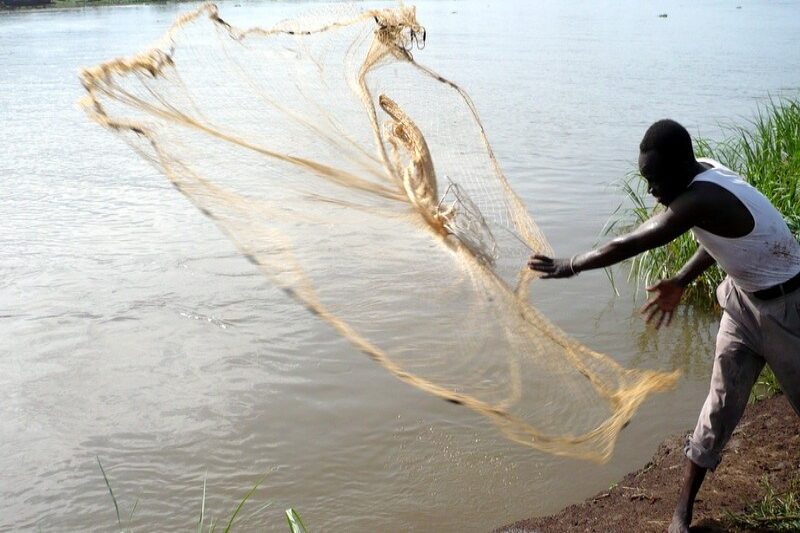At least 48 fishermen were shot dead in an attack by suspected Islamic State West Africa Province (ISWAP) insurgents on Wednesday, March 8.
The farmers and fishermen, mostly internally displaced persons (IDPs) and residents from host communities in Dikwa town, were killed while fishing and fetching firewood in Mukdolo, a border town between the Dikwa and Gamboru Ngala local government areas in Borno State.
A security analyst said the insurgents had tied up the fishermen by wrapping them in their nets. They tortured them and then shot them, killing them instantly.
The exact number of people killed was not yet known. People are still missing and are thought to have been killed or maybe in hiding.
On Thursday a rescue team found two bodies in the bush. Both were decomposed. The team was unable to move the bodies and they were buried in the bush.
The military announced on Thursday that it had put a restriction order in place, stopping people from going fishing and collecting firewood. They told residents to keep away from the bush until they received security clearance.
The dead bodies were buried on Thursday at various internally displaced persons’ camps, where most of the victims lived. A massive funeral was held for those from the Sangaya, Shuwari and Kamceji camps. Other funerals were conducted in Guduram, Antul, Kawari and Mukdolo.
Zara Adam, the widow of a slain fisherman and a mother of seven, said: “I can’t believe he is gone. He left home after playing with the kids. My eldest son wanted to go with him but he refused, saying our son could accompany him “next time”.
“Life has been tough after our displacement. My husband was the kindest man and he was good to us throughout his life. He spent most of the time working so that he could provide food and other essentials for us. We never lacked food. He really took good care of us. Now he is no more and I’m worried about who will take care of me and the children. We are lost without him.”
Musa Ngubdo, who lost his brother in the attack, said: “This was a senseless attack on the innocent people who were just struggling to feed their families. We were told that the attack was some sort of revenge. But a revenge for what? They were innocent people – how can they [insurgents] take revenge on innocent people? What was their fault? What did they do wrong? We need justice.”
One of the fishermen from Dikwa town, who asked to remain anonymous, told RNI reporter Bintu Goni that the insurgents – thought to be ISWAP members – arrived on motorbikes from a nearby forest and surrounded them.
“They started shooting in all directions. Only three of us made it back to Dikwa. Many people were killed. As I speak many farmers and fishermen have not returned to Dikwa town. We believe some were killed. Others could be in hiding.”
A resident, who also asked to remain anonymous, said that when the insurgents arrived the fishermen became scared and started to run away.
“The insurgents told the fishermen and wood collectors that they had nothing to fear so some returned and calmly continued fishing. Later, the insurgents returned to the riverbank where they tied up the fishermen in their nets and shot them. We are not sure yet how many fishermen and farmers were killed. It has been confirmed that at least two of them were seriously wounded.”
Other residents told RNI that the soldiers and civilian joint task force members had taken the corpses of the slain men to Dikwa town.
Zagazola Makama, a counterinsurgency expert and security analyst in the Lake Chad region, said that dozens of insurgents riding motorbikes stormed the area where the men were fishing and collecting wood.
They were firing haphazardly, he said.
He knew of nine men who were able to flee, three of whom had bullet wounds. The rest of the victims were told to lie down. The insurgents tied the men up using their fishing nets.
“They began torturing the men until they were unconscious. Then they fired at them, killing them instantly.”
Makama said the attack occurred one week after the troops of Operation Hadin Kai had intercepted and killed an insurgent commander and some of his fighters during an army patrol in Mukdolo village.
The United Nations (UN)strongly condemned the reported ambush and brutal killings.
Matthias Schmale, the UN’s resident and humanitarian coordinator in Nigeria, extended heartfelt condolences to the bereaved families and wished the wounded a speedy recovery.
The UN said the attack occurred in an area that was “very insecure”.
It said the “deeply shocking” attack was another horrific reminder of the real threats of violence and insecurity that IDPs and other people affected by more than 13 years of armed conflict in the region continued to face daily in their struggle to survive.
SHETTIMA LAWAN MONGUNO








